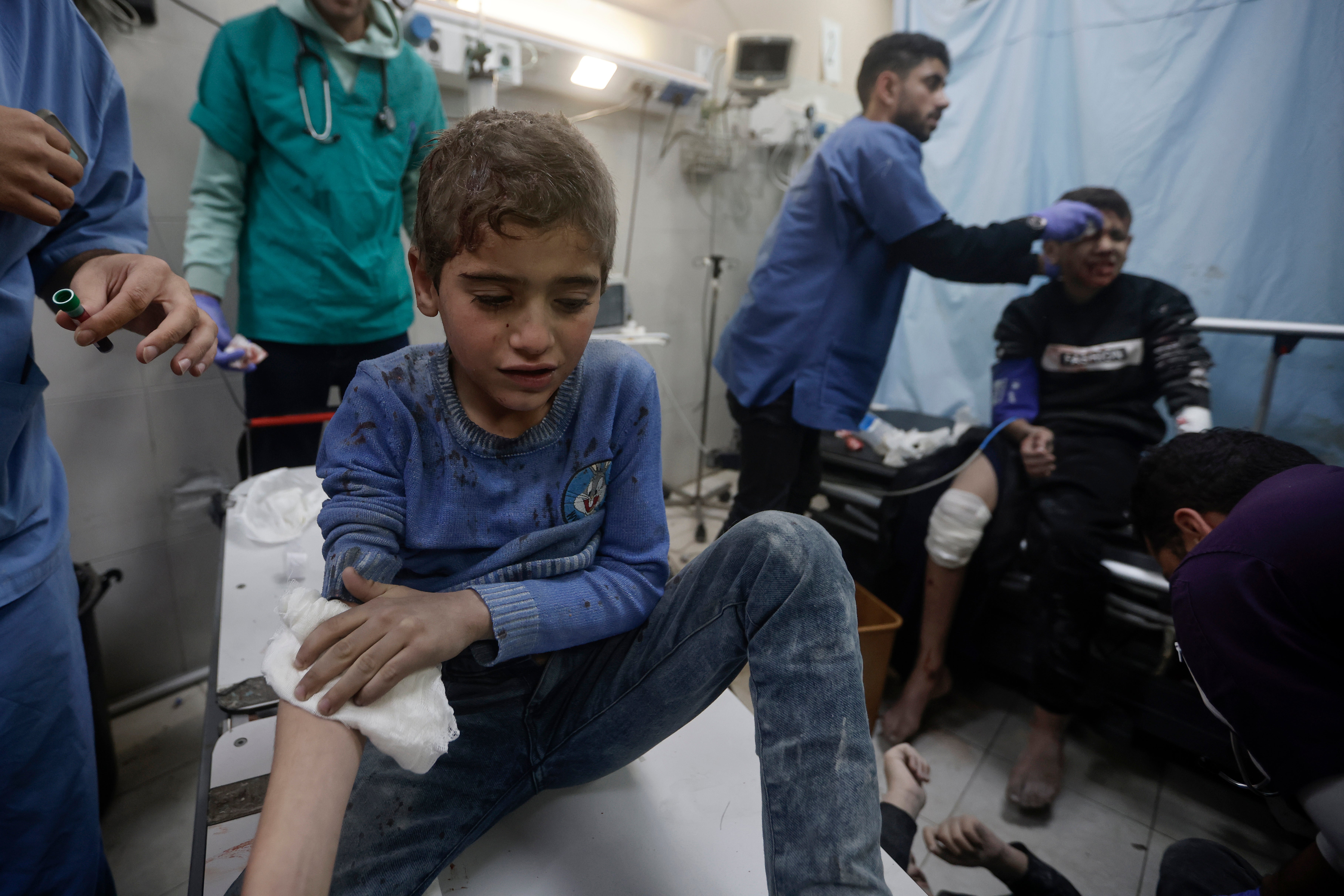Desperately trying to save children at one of Gaza’s last functioning hospitals
Dr Seema Jilani is a paediatrician who has just evacuated from al-Aqsa Hospital in central Gaza, where fighting has intensified. Tom Bennett hears her moving account of severe injuries, depleting supplies, and how she fought to let those she couldn’t save die with dignity

An 11-year-old girl with deep-tissue burns so extensive that her extremities have stiffened, screaming from her hospital bed through lungs choked by smoke. A one-year-old infant who endured a traumatic amputation of his leg, still wearing his bloodstained nappy. A stray bullet ricochets into the intensive care unit, as airstrikes pound the streets just metres away.
These are the scenes inside Gaza’s al-Aqsa Martyrs Hospital, as described by Dr Seema Jilani, who has been working on its wards and in its operating theatres as part of a delegation of medical staff from the humanitarian aid group the International Rescue Committee.
Al-Aqsa Hospital – situated in Deir al-Balah, in central Gaza – is “the most important hospital remaining in Gaza’s Middle Area”, according to World Health Organisation chief Dr Tedros Adhanom Ghebreyesus. It has been at the centre of spiralling violence in recent weeks, as fighting between the Israeli military and Hamas has intensified in the surrounding area.
When Jilani, a paediatrician, first arrived at the hospital in late December, she described seeing black smoke spiralling from bombed-out buildings around 600 metres away from the hospital. Days later, the destruction was just 400 metres away. Each day she was there, the windows would reverberate a little more as the Israeli forces closed in.
“Every day, going up and down the staircase, you would notice the palpable tension rise as people began to get more and more concerned about what it meant, that the hospital was becoming increasingly busy,” says Jilani.

As of Monday, around 70 per cent of health workers had evacuated the hospital – including Jilani and her team. On Wednesday afternoon, an Israeli airstrike hit a two-storey building near the hospital’s entrance, killing at least 20 people, according to hospital officials. Their funerals will be held this week.
Now, there is serious concern for those remaining on the hospital’s grounds, as the fighting rages on and conditions deteriorate further.
In recent weeks, the hospital has been overwhelmed by civilians seeking shelter inside. Families, pregnant women and children have tussled for space amid the chaos, staking out their claim for “every square inch of the hospital”, which has become “their bedroom, their kitchen, their life, their home”.
The Israel-Hamas war was triggered by an unprecedented attack by Hamas gunmen on southern Israel on 7 October, in which at least 1,140 people were killed – most of them civilians – and around 240 others taken hostage. In response, Israel commenced its aerial bombardment of Gaza, combined with ground operations and a blockade that has left food, water, fuel and medical supplies running low.
According to Jilani, many of the local medical staff at the facility have been sleeping on site. Some are spending their nights “scavenging for food and water”, while others are having to evacuate their own families from area to area. She recalls seeing members of staff recognise some among the dead and wounded as people they knew.

More than 23,000 people have been killed in Gaza – mostly children and women – since the conflict began 13 weeks ago, according to health ministry officials in the Hamas-run territory. Since the war began, tens of thousands of people have sought shelter in hospitals across the territory. Only 13 of Gaza’s 36 hospitals are even partially functional, according to the UN humanitarian office.
“As a paediatrician, I’ve been in several conflict areas, active war zones, Afghanistan, Iraq and elsewhere,” Jilani says. “I did not expect to be of that much use in a war.
“At one point, however, of the five patients that were in the resuscitation room, four were children... several severely injured and war-wounded,” she adds. “I was shocked and deeply appalled by the number of children and babies that I was forced to take care of as a result of bombardment and airstrikes.”
The scene that has stuck with Jilani the most, however, is that of a 23-year-old aid worker whose leg was blown off. The hospital had run out of morphine, so he was initially treated with alternative, inadequate medication. He was gasping for water, but as he was due to have surgery he was not allowed to ingest any.
“So I did something very simple and I just took some water and a little bit of whatever was left over of gauze that day, and simply just stroked his forehead with cold water, wiped his face down from the blood, removed the debris and dust and then put the water from the gauze to his lips. And that’s when he completely quieted and was calm, despite the massive injuries that he sustained... He just wanted a dignified death,” she says.
Tedros has said that the UN agency has “received troubling reports of increasing hostilities and ongoing evacuation orders near the vital al-Aqsa Hospital ... which according to the facility’s director forced over 600 patients and most health workers to leave”.
He said that al-Aqsa “must remain functional, and protected, to deliver its lifesaving services”, adding: “Further erosion of its functionality cannot be permitted – doing so in the face of such trauma, injury and humanitarian suffering would be a moral and medical outrage.”
Join our commenting forum
Join thought-provoking conversations, follow other Independent readers and see their replies
Comments
Bookmark popover
Removed from bookmarks